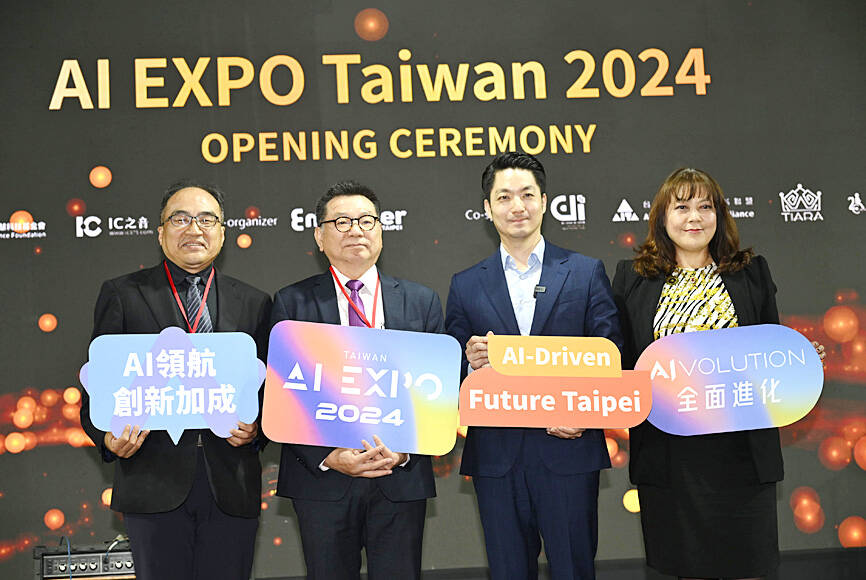The potential of generative artificial intelligence (AI) is “infinite” and it is therefore hard to estimate what its market value could rise to, evidenced by the huge range of predictions — US$200 billion to US$7 trillion — made by various institutions, Qualcomm Technologies Inc vice president S.T. Liew (劉思泰) said at an AI event in Taipei yesterday.
Liew, who is also president of Qualcomm’s business in Taiwan and Southeast Asia, told a keynote speech at the AI Expo Taiwan that the world has embarked on a journey to be at one with “AI everywhere.”
That means more processing power will be required and applications of all kinds from cloud services to edge AI will be developed, he said.

Photo: Chang Chia-ming, Taipei Times
“Statista Market estimated the value of the generative AI market will rise to US$207 billion in 2030, Bloomberg Intelligence said US$1.3 trillion by 2032, and McKinsey & Co forecasted that it could eventually be worth up to US$7.9 trillion,” Liew said.
“But these are just business scales; if you take into account all the direct and indirect productivity improvement and consumer satisfaction improvement, even US$7.9 trillion is considered low,” he said.
Generative AI refers to a type of AI that can create new content and ideas, for example, stories, videos and music.
With 5G connectivity in place, AI will not only be “connected everywhere,” but that connectivity will also be “intelligent” and will be able to be used for daily tasks such as “the car calculating the fastest route to my office with a stop to buy a cup of coffee,” Liew said.
These are the edge AI or “on-device AI” applications, he noted, which ABI Research, a global advisory firm providing strategic analyses on technology, forecast could overtake cloud AI services by revenue in 2028.
“There will be billions of devices in the world equipped with AI, so you can imagine the business opportunities for companies of all sizes. This is in contrast to cloud services which are dominated by a few tech giants,” Liew said.
On-device intelligence has also the benefit of reducing costs and energy as the cost and power of transmitting data to the cloud is saved, he said.
“Devices can also be personalized without risk of a privacy leak because a cloud service is not being used,” he added.
The Qualcomm executive said the company has a mission to build an “ecosystem” around Generative AI with shared tools and resources to increase the opportunities for all partners to innovate and make new products.
The AI expo opened yesterday and runs until tomorrow at Taipei Expo Park.

Handset camera lens maker Largan Precision Co (大立光) on Sunday reported a 6.71 percent year-on-year decline in revenue for the third quarter, despite revenue last month hitting the highest level in 11 months. Third-quarter revenue was NT$17.68 billion (US$581.2 million), compared with NT$18.95 billion a year earlier, the company said in a statement. The figure was in line with Yuanta Securities Investment Consulting Co’s (元大投顧) forecast of NT$17.9 billion, but missed the market consensus estimate of NT$18.97 billion. The third-quarter revenue was a 51.44 percent increase from NT$11.67 billion in the second quarter, as the quarter is usually the peak

Taiwan’s foreign exchange reserves hit a record high at the end of last month, surpassing the US$600 billion mark for the first time, the central bank said yesterday. Last month, the country’s foreign exchange reserves rose US$5.51 billion from a month earlier to reach US$602.94 billion due to an increase in returns from the central bank’s portfolio management, the movement of other foreign currencies in the portfolio against the US dollar and the bank’s efforts to smooth the volatility of the New Taiwan dollar. Department of Foreign Exchange Director-General Eugene Tsai (蔡炯民)said a rate cut cycle launched by the US Federal Reserve

The US government on Wednesday sanctioned more than two dozen companies in China, Turkey and the United Arab Emirates, including offshoots of a US chip firm, accusing the businesses of providing illicit support to Iran’s military or proxies. The US Department of Commerce included two subsidiaries of US-based chip distributor Arrow Electronics Inc (艾睿電子) on its so-called entity list published on the federal register for facilitating purchases by Iran’s proxies of US tech. Arrow spokesman John Hourigan said that the subsidiaries have been operating in full compliance with US export control regulations and his company is discussing with the US Bureau of

Pegatron Corp (和碩), a key assembler of Apple Inc’s iPhones, on Thursday reported a 12.3 percent year-on-year decline in revenue for last quarter to NT$257.86 billion (US$8.44 billion), but it expects revenue to improve in the second half on traditional holiday demand. The fourth quarter is usually the peak season for its communications products, a company official said on condition of anonymity. As Apple released its new iPhone 17 series early last month, sales in the communications segment rose sequentially last month, the official said. Shipments to Apple have been stable and in line with earlier expectations, they said. Pegatron shipped 2.4 million notebook